ASRock DeskMeet B660 Review: An Affordable NUC Extreme?
by Ganesh T S on January 23, 2023 8:30 AM EST- Posted in
- Systems
- ASRock
- SilverStone
- SFF
- Mushkin
- Alder Lake
- B660
- DeskMeet
- Raptor Lake
System Performance: Multi-Tasking
One of the key drivers of advancments in computing systems is multi-tasking. On mobile devices, this is quite lightweight - cases such as background email checks while the user is playing a mobile game are quite common. Towards optimizing user experience in those types of scenarios, mobile SoC manufacturers started integrating heterogenous CPU cores - some with high performance for demanding workloads, while others were frugal in terms of both power consumption / die area and performance. This trend is now slowly making its way into the desktop PC space.
Multi-tasking in typical PC usage is much more demanding compared to phones and tablets. Desktop OSes allow users to launch and utilize a large number of demanding programs simultaneously. Responsiveness is dictated largely by the OS scheduler allowing different tasks to move to the background. Intel's Alder Lake processors work closely with the Windows 11 thread scheduler to optimize performance in these cases. Keeping these aspects in mind, the evaluation of multi-tasking performance is an interesting subject to tackle.
We have augmented our systems benchmarking suite to quantitatively analyze the multi-tasking performance of various platforms. Our previous attempt involved the triggering of a VLC transcoding task to transform 1716 3840x1714 frames encoded as a 24fps AVC video (Blender Project's 'Tears of Steel' 4K version) into a 1080p HEVC version in a loop. VLC internally uses the x265 encoder, and the settings are configured to allow the CPU usage to be saturated across all cores. Unfortunately, with some of the large core-count systems, we found VLC falling back to single-core usage. We have since replaced it with a ffmpeg transcoding task that appears to uniformly load the cores even in the Raptor Canyon NUC. The transcoding rate is monitored continuously. One complete transcoding pass is allowed to complete before starting the first multi-tasking workload - the PCMark 10 Extended bench suite. A comparative view of the PCMark 10 scores for various scenarios is presented in the graphs below. Also available for concurrent viewing are scores in the normal case where the benchmark was processed without any concurrent load, and a graph presenting the loss in performance.
| UL PCMark 10 Load Testing - Digital Content Creation Scores | |||
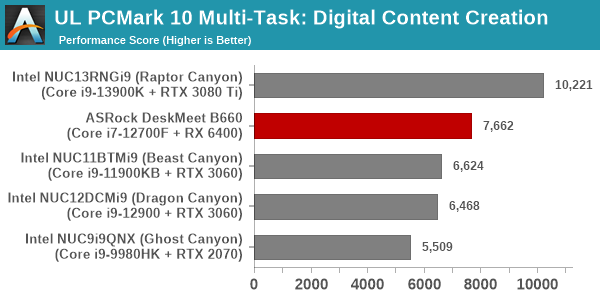
| UL PCMark 10 Load Testing - Productivity Scores | |||
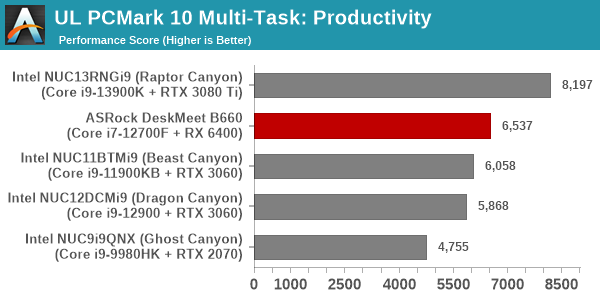
| UL PCMark 10 Load Testing - Essentials Scores | |||
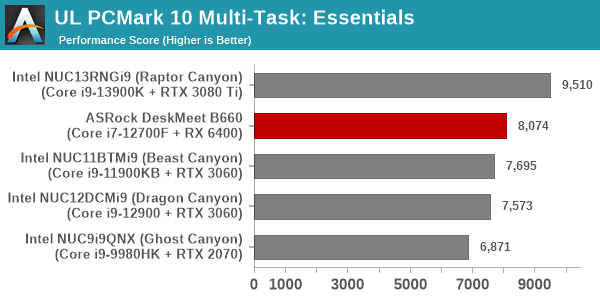
| UL PCMark 10 Load Testing - Gaming Scores | |||
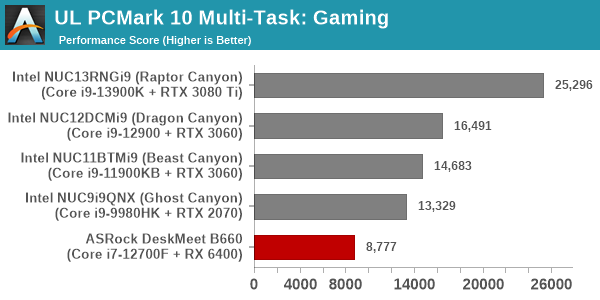
| UL PCMark 10 Load Testing - Overall Scores | |||
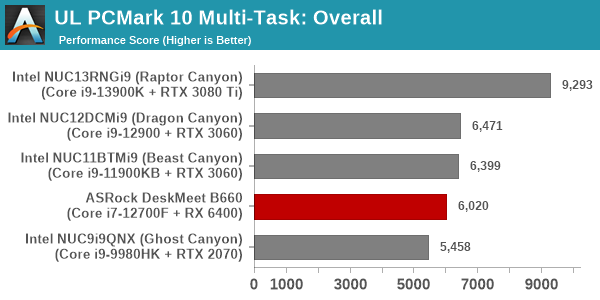
The performance loss in the PCMark workloads range between 25% and 33%, with the DeskMeet B660 managing to score the lowest overall performance loss numbers.
Following the completion of the PCMark 10 benchmark, a short delay is introduced prior to the processing of Principled Technologies WebXPRT4 on MS Edge. Similar to the PCMark 10 results presentation, the graph below show the scores recorded with the transcoding load active. Available for comparison are the dedicated CPU power scores and a measure of the performance loss.
| Principled Technologies WebXPRT4 Load Testing Scores (MS Edge) | |||
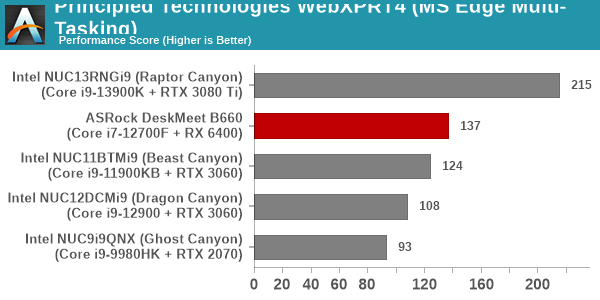
Here, the performance loss for the DeskMeet B660 is heavier, with the extra cores in the Raptor Canyon enabling it to balance both the transcoding and web browsing tasks in a more effective manner.
The final workload tested as part of the multitasking evaluation routine is CINEBENCH R23.
| 3D Rendering - CINEBENCH R23 Load Testing - Single Thread Score | |||
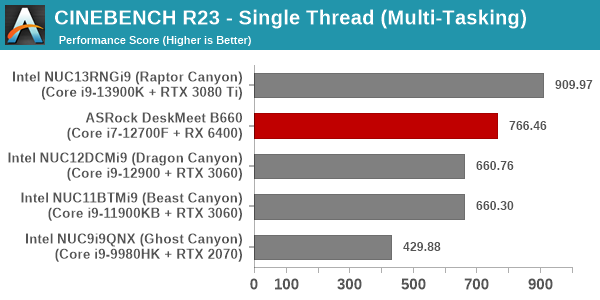
| 3D Rendering - CINEBENCH R23 Load Testing - Multiple Thread Score | |||
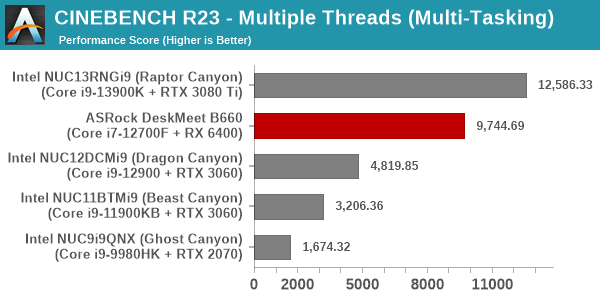
The DeskMeet B660 manage to get back to the top spot in terms of minimizing performance loss with the concurrent load being active.
After the completion of all the workloads, we let the transcoding routine run to completion. The monitored transcoding rate throughout the above evaluation routine (in terms of frames per second) is graphed below.
A quantitative view of the transcoding performance in the different stages is presented in the table below.
| ASRock DeskMeet B660 ffmpeg Transcoding Rate (Multi-Tasking Test) | |||
| Task Segment | Transcoding Rate (FPS) | ||
| Minimum | Average | Maximum | |
| Transcode Start Pass | 5.5 | 18.74 | 55 |
| PCMark 10 | 0 | 17.23 | 50.5 |
| WebXPRT 4 | 5.5 | 17.87 | 52 |
| Cinebench R23 | 3.5 | 17.21 | 48 |
| Transcode End Pass | 5.5 | 18.68 | 53 |
Across all phases, the loss in transcoding performance is minimal. During periods of heavy multi-threaded loading like PCMark 10 and Cinebench R23, the transcoding does experience some hiccups, but always recovers within a short while.


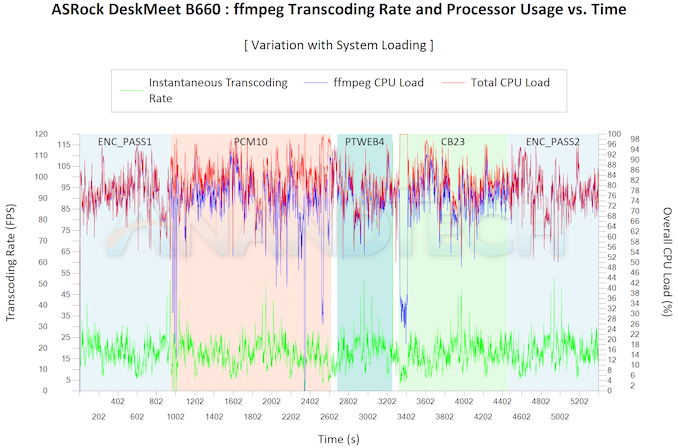








27 Comments
View All Comments
ganeshts - Thursday, February 9, 2023 - link
I apologize for the error in the comment above. There is plenty of space available on the inside of the inner frame to mount 2x 2.5" disk drives adjacent to the front I/O.Please check the first column in the picture here:
https://www.asrock.com/nettop/sticker/MeetX300-Exp...
Note that the 3.5" drive installation could cause interference with cabling if a dual slot GPU is installed, but 2.5" drives should not be an issue.
ganeshts - Friday, January 27, 2023 - link
Yes, there is a 8-pin connector from the PSU. You can also check out the Graphics Card QVL on the ASRock website for the product. There are a few 3060 models in there.Hrel - Thursday, January 26, 2023 - link
still way too many trade offs, going smaller than mini-ITX just takes you out of the PC world in every meaningful way. GPU's that fit this thing are almost exclusively Nvidia and the fastest you can get is RTX3060... however with one fan on the card and that small space it's gonna die quickly, as well as the rest of these components.Mr.Vegas - Friday, January 27, 2023 - link
There is 3060ti made by asus that fits there, dual slot and less than 20cmshrimp_parm - Thursday, February 9, 2023 - link
"Since the DeskMeet B660 is a consumer-focused system, the UEFI has all the bells and whistles including the ability to update firmware directly from the Internet and fine-grained control of the fan speeds in relation to the temperatures."Is it possible to update bios via internet without the need for a 12th gen cpu, to accommodate 13th gen cpu's?
Thanks
LMao HAHA - Sunday, March 12, 2023 - link
I have one and want to know actually. I still need CPU and haven't build it since Nov. But I think if you bought one recently past 2023, it may have the 13th gen Bios ready.marcelop67 - Monday, February 13, 2023 - link
This makes a great little Proxmox server. I have installed an i5 12400, 128GB memory, dual Samsung 980 PRO 1TB, dual WD Red 2TD SATA SSD's and an Intel quad port PCIe card,When you are concerned about the M.2 SSD slot on the motherboard's underside, you can use a Be quiet! MC1 M2 SSD heatsink. It fits perfectly and reduces the operating temperature by ~15 degrees Celsius. (at least with my Samsung 980 Pro's).